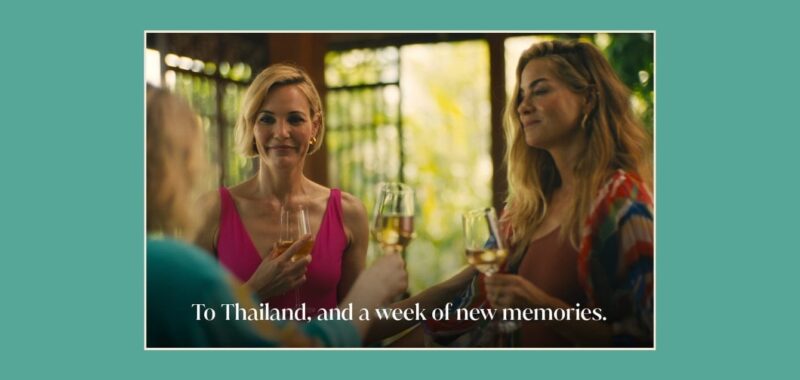It’s been a few days since The White Lotus Season 3 finale aired—and yet, that final dinner scene between childhood friends Laurie, Kate, and Jaclyn still lingers.
Because beneath the Thai resort glow and ocean views, the show didn’t just wrap up a vacation. It offered something far more lasting: a quiet truth that many women—especially mothers—carry every day. That growing up together doesn’t mean growing in the same direction. That even our most trusted friendships can hold comparison, performance, and grief—for the choices we made, and the ones we didn’t.
On paper, it’s the girls’ trip of a lifetime: a week of sunrise yoga, wellness rituals, coordinated coverups, and coconut cocktails. But The White Lotus offers more than glossy escapism. Season 3 becomes a case study in the subtle unraveling of lifelong friendship—especially when identity, motherhood, and quiet discontent begin to surface.
Related: This is what friendship *really* looks like after kids
Laurie (Carrie Coon), Kate (Leslie Bibb), and Jaclyn (Michelle Monaghan) have been inseparable since childhood. But as is often the case with long-standing friendships, time has pulled them in different directions. One found family. One found fame. One is still searching for a sense of home in herself. And by the time the finale rolls around, it’s clear: their lives—and the stories they tell themselves about each other—no longer align.
Throughout the season, we watch how easily their bond frays. They confide in pairs, gently dissecting the absent friend’s shortcomings. Kate and Jaclyn whisper about Laurie’s drinking. Laurie and Kate speculate about Jaclyn’s younger husband. These conversations aren’t overtly cruel, but they’re revealing—mirroring the subtle judgment, envy, and defensiveness that can bubble up when old friendships stretch across new life stages.
And still, this is the group Laurie turns to in the end.
Related: Mom on a mission: I only have time for real, meaningful friendships
During their last dinner together, Jaclyn radiates gratitude for her Hollywood rebirth. Kate beams about her family and the joy of finally being in a “season of reaping.” But Laurie cuts through the small talk. “All week I’ve just been so… sad,” she says.
She doesn’t pretend. She doesn’t deflect. Instead, she names the thing so many women fear to admit aloud: that all the right choices—love, work, even motherhood—didn’t add up to fulfillment. That meaning doesn’t always come from the roles we’re told will complete us. And yet, in her grief, she lands on something real: “We started this life together,” she tells her friends, “and I look at you guys and it feels meaningful.”
It’s not a tidy resolution. But it’s deeply human.
And in that moment, the season’s emotional thesis becomes clear: real friendship doesn’t require perfect alignment—it requires presence. Motherhood isn’t a guaranteed source of meaning—it’s one of many roles we step into, sometimes searching, sometimes surviving. And the bonds that last are rarely uncomplicated. They’re layered with love, resentment, awe, distance, and loyalty.
What makes Laurie’s confession so impactful is how it reframes motherhood—not as a guaranteed source of fulfillment, but as a role that doesn’t always quiet the deeper questions women carry. Her moment disrupts the familiar narrative that parenting inherently brings purpose. For some women, it does. For others, it may not—and that tension deserves space. Motherhood can be deeply meaningful and still leave room for uncertainty, reflection, or longing. It doesn’t fix everything. It’s simply one piece of who we are.
That theme—of emotional performance—is the season’s throughline. Kate’s family life seems idyllic, but her inner world remains a mystery. Victoria, another mother at the resort, pops pills and smiles through “spiritual awakenings” while quietly falling apart. Even Jaclyn’s glow conceals a woman increasingly concerned with her relevance. They’re all projecting versions of themselves that feel safe. That feel acceptable.
Related: Erin Andrews says she ‘felt like a failure’ trying to balance work and motherhood
And if you’re a mom watching, it’s all painfully familiar.
We know what it’s like to praise a friend’s seemingly “perfect” life while quietly wondering why ours feels stalled. We know how easily we smile through sadness. We know the pressure to show up as the mom who has it all figured out—even when we don’t. And we know how friendships shift over time. Not always in dramatic breakups, but in micro-moments. In mismatched expectations. In silences that slowly widen.
The White Lotus doesn’t offer easy answers. But it does offer a mirror.
It invites us to reflect—not just on who we’ve become, but on how we’ve changed in relation to the people who knew us before we were mothers. Before we were partners. Before we were tired.
And maybe that’s what real connection is. Not agreement. Not perfection. Just a willingness to stay in the room long enough to tell the truth.

